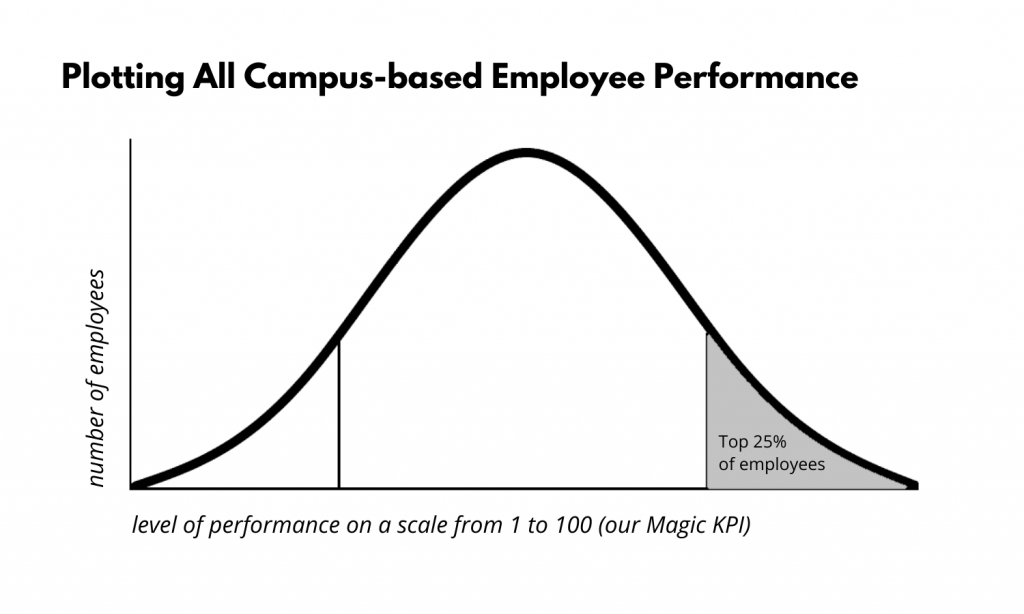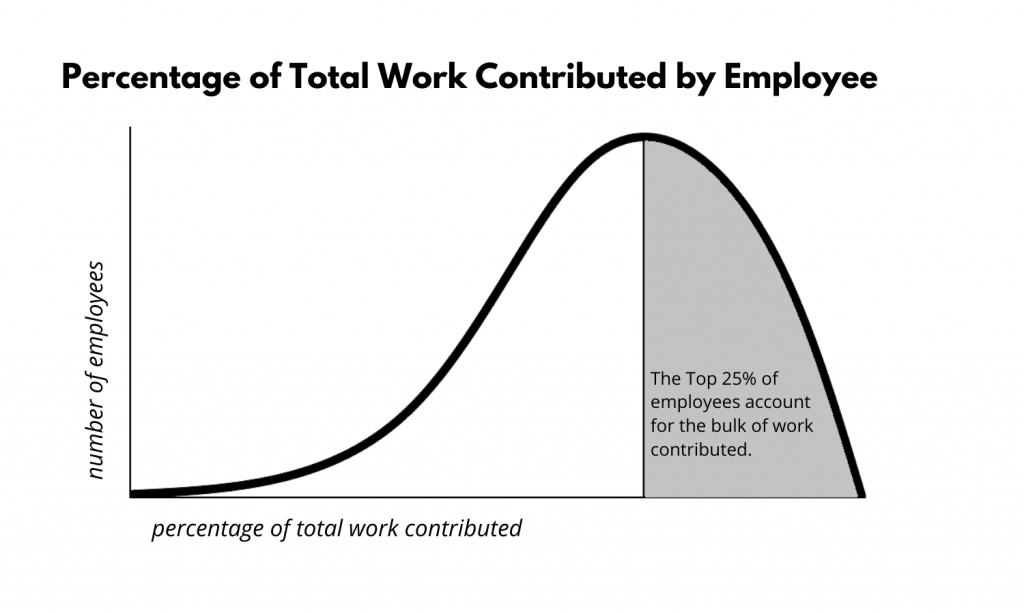Published on
The Logical Argument for Quitting Academia

Higher education has a problem that’s not going away: employee retention.
In other words: Here’s the logical argument for why you should quit academia.
Magic KPI’s & Bell Curves
Let’s imagine for a moment the perfect key performance indicator (KPI) that measures every employee’s performance according to an ideal standard.
Of course, it’s not real. It’s magic and it accounts for everything that can be accounted for: discipline, rank, job function, gender, race and any other magical metric that can be tracked.
If you plotted every university employee on a graph, you’d probably get a standard bell curve. The bulk of employees would fall in the middle with a few low performers on the left and a few high performers on the right.

Next, let’s plot each employee’s contribution, which ultimately translates to each employee’s potential worth. I say potential and not actual because some of the highest contributors are the lowest paid.
This time you get a skewed curve when you plot each employee. The highest performers on the original graph now account for most of the measurable performance.

What does this mean?
Universities and colleges currently face the same glaring problem—how do we serve more students with fewer resources?
We’ve already seen some hard decisions universities have made to cut costs, such as mass firings of adjuncts, loss of tenure or security and staff lay-offs.
I remember sitting across from a newly appointed dean at a conference. She was at a loss. The next week, she had to lay-off friends she had had for 25 years. These are hard, hard times.
Further cuts are coming. Otherwise more institutions will close.
When administrators are making those hard decisions, the people who are going to get cut fall into two buckets. They are either low performers or expensive ones.
But there’s a group they’re ignoring all together: inexpensive high performers.
These are folks with the most drive and opportunity to make a transition into industry careers—and they’re leaving en masse.
Check out these two fast-growing Facebook groups for proof/your own support: The Professor is Out and Expatriates of Student Affairs.
Once administrators figure out how to cut costs and those inexpensive high performers leave, higher ed still has the other half of the problem and must figure out how to do more with less. That introduces many complications.
Increased workloads and expectations on the ones who stay are the most relevant for this discussion.
And you thought things were bad before? Just wait. There’s more…
The Student Enrollment Problem
Even before the COVID-19 pandemic, experts warned of what they called the 2025 cliff. Due to the 2008 recession and the resulting declining birth rate, there will be a huge drop of kids reaching college age in the year 2025.
Conservative estimates predicted anywhere from a 10-15 per cent drop in undergraduate enrollment. And that was before the pandemic, which has only sped everything up.
Undergraduate vs Graduate Student Enrollment
What about all the students who just finished? Enter the rise of marketing for graduate schools. Luckily, or unfortunately, universities see this new path as little more than supplemental revenue until the pandemic ends.
So, many people now face an unanticipated job market, and they’re asking themselves, “What’s a safe move I can make until this blows over?”
Their answer, which is problematic for so many reasons, is to go to graduate school.
Sigh… Okay, but what happens when you graduate?
If there is an increase in graduate enrollment, there will be an increase in qualified candidates for the jobs you want now, and those new grads will be willing to work for less than current employees looking to stay in the industry.
The key takeaway here is that unless you need an advanced degree for a specific job, don’t go to grad school. And if you do need a specialized degree, check out what adjacent careers exist that you can enter immediately.
Decreased undergrad enrollment combined with increased graduate enrollment means higher education is going to have a bigger problem in five years than it does now.
So, What Should You Do?
If you’re an administrator, you need to focus on making your employees feel valued. You can only tap their altruism to a point.
If you’re thinking of quitting academia, you should.
If you’re thinking of going to graduate school, you shouldn’t.
What Are Some Actionable Steps You Can Take to Quit Academia?
People need community and connections. Some find solace in their existing networks, some will hire career coaches and some will join social media groups. Everyone needs to connect to someone.
I give people two pieces of advice:
First, connect with people. Ask them for an informational interview. Ask, “How does someone like me fit into a world like yours?”
Second, learn the language by using LinkedIn Learning. Take courses offered through universities, libraries or online. Many of those courses can be found for free as well. You want to learn how to talk about your own experience using industry lingo.
Author Perspective: Administrator


